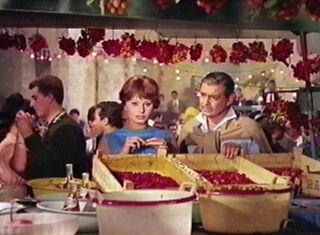It started in Naples
1960 US
Dir:Melville Shavelson
Stars:Clark Gable, Sophia Loren,
Vittorio De Sica, Marietto
Left:Sophia Loren, Right:Clark Gable
"It Started in Naples" is one of the most color-satulated movies
ever made in English language.
The first thing that attracts our attention in this movie is its gorgeous color.
Although it is of cource true that this movie is, as the title suggests, shot in Italy where essentially the nature
has more variety than in snow-covered northern areas, even so I still have to stress the point that "It Started
in Naples" is one of the most color-satulated movies ever made in English language. And the color in this
picture is not the artificial one, but quite natural. Why I'm pointing out this seemingly obvious fact is because
as color movie wasn't still the matter of fact in the age when this movie was made, there appeared quite a few
movies that boast the gorgeousness of dazzling color whose nature isn't so natural, but rather artificial utilizing,
for example, sumptuous interior decoration and deliberately accentuating some color hue. For instance, director
Vincente Minnelli has this tendency toward saturating his movies with the splendor of artificial color and it seems
that he especially liked red as a keynote. The keen sense toward artificial colorliness of this age, I presume,
somehow derived from the pure artistic interest in color as a media because of the absence of color scheme in the
previous age.
The gorgeousness of natural color in this movie is accurately
mirroring the culturally molded value orientation, or rather
the back side of it.
In contrast, the color splendor in "It Started in Naples" comes from
the nature itself depicted in this movie. This very trait seems to me to be proving the point that some craving
for abundance of nature of those who living in the north western hemisphere is showing in this movie quite clearly
through expressing surplus colorliness utilizing the nature of a southern country Italy. In short, I'm thinking
that, unlike the case of interests in artificial color, the gorgeousness of natural color in this movie is accurately
mirroring the culturally molded value orientation, or rather the back side of it, of the north western countries
where efficiency and rationality based upon economic principles are the primary concerns and where suplus(ness)
is usually equated with superfluous(ness). As I feel I might be misunderstanding the meanings of these words on
account of the fact that I'm a Japanese, I clarify it a little bit further. That is, whereas when I say "surplus(ness)"
I regard it as a value neutral word, when I say "superfluous(ness)" I regard it as a word containing
some negative connotation in terms of economically sanctioned value orientation. Anyway, this point can also be
deduced from the plot line itself.
Then, what's the story like?
The story goes like this. An American businessman played by Clark Gable comes
to Italy for settling some chores arising from his brother's accidental death. There he finds his brother's son
in the care of the sister (played by Sophia Loren) of the wife who died along with his husband by the car accident.
Firstly, Gable acts like a typical American businessman, which means he never deviates from the pattern based upon
efficiency, rationality, and regurality according to which he has been always doing everything in America. Therefore,
he can never believe Italian people are still eating and drinking outside even after the midnight, and he doesn't
want to drink water from a faucet in Naples station. The most funniest habit of this methodical businessman is
the way he makes American hamburgers. He makes hamburgers as if making cars in an assembly line in a car factory.
Anyway, while staying at Italy, he is gradually beginning to think he should bring his brother's son back to America
after considering in his own one-sided perspective the environment where his brother's son is being brought up.
Of cource, the son's guardian Sophia Loren doesn't like this and sues him. Although she wins the trial thanks to
the Gable's lawyer played by quite funny Vittorio De Sica who acts like no one knows which side he is on, she,
considering his future and changing her mind, tactfully forces the son to go to America with Gable. But, it finally
turns out that it is actually Clark Gable who has gradually become accustomed to the way of thinking that he never
thought it would exist that finally changed the mind, because he decides to stay at Italy with his brother's son
and Sophia Loren.
Through the presentation of this movie itself, we can somehow know
what sort of people made this movie.
As you might notice, this story certainly contains cliche ridden elements;
that is, rationalist American and hedonist Italian. But, even so, it has some truth in them if in a somewhat exaggerated
way. When I said the gorgeous color of this movie is mirroring the culturally molded value orientation or rather
the back side of it, I exactly pointed out this aspect; that is, this movie is definitely made by persons who were
brought up in the culture that weighs the rational aspect quite heavily. In short, not only through the attitudes
of the principal Clark Gable, but also through the presentation of this movie itself, it can be easily sensed that
there is some dose of hankering for something, something different from the life style of those who made this film.
For example, I guess there would be not so many of offices in the modern business world whose interior decoration
is something like living in Italy. The reason for it is because, in usual business world, excessiveness, be it
regarding very trivial things like color or something more important, is liable to be regarded as superflous and
redundant and in economic terms quite useless. This way of thinking must suppress some aspect of life quite strongly,
because the lifeworld in Jurgen Habermas' sense isn't constitued according to the principles of economic subsystem,
and this suppression certainly spawns hankering for the life style quite different from the one already adapted
to economic principles.
Such a world under which value is primarily measured by mediating
media of money will never accept the surplusness of anything.
Let's think it slightly different way. The modern business world is an economic
world where the principle of supply and demand predominates. And such a world under which value is primarily measured
by mediating media of money, not by things' essential use-value itself will never accept the surplusness of anything,
because surplusness of anything means the destruction of the value of that anything when measured in terms of mediating
media money, and this in turn might mean the beginning of the destruction of the carefully maintained equilibrium
of economic subsystem retained by mediating power of money. I certainly consider that the persons who have long
been living in such a world would tend to measure everything in terms of mediating media such as money and power,
and couldn't evaluate anything in terms of the values inherent in them (I'm quite aware of the fact that I am certainly
avoiding here the argument concerning wherther there is actually the values inherent in things themselves), much
less admit the surplusness of anything. Saying in a very very exaggerated way, I even think that only those people
who live in such a repressed economic world could depict Italy in this movie's way (i.e; depict it like a country
enriched by the excessive beauty of gorgeous scenery and here and there hedonistic pleasure present, or something
like that), because the people actually living there couldn't miss the real aspects of the lifeworld.
Anyway, this movie is quite entertaining and fun to watch.
This is exactly what I want to say about this film. But, at this point, as
I somewhat feel I have said too much a complicated thing for just a comedy, I would like to add this; that is,
this movie is simply quite entertaining and very fun to watch. As I've been repeatedly saying, the scenary shot
in Italy is brethtakingly beautiful. Furthermore, the music composed by Alessandro Cicognini who also wrote the
famous music in "Summertime"(1955) has everything you want to hear in movies shot in Italy. And the scene
where Sophia Loren is singing a song in quite coquettish outfit is definitely a bonus especially for male audience.
Finally, I have one question about this movie. That is, when Sophia Loren is begging something of Vittorio De Sica,
he says something like "I've completely forgot who won the Oscar this year". But, I was thinking this
movie was made before Sophia Loren got the Oscar by "Two Woman"(1960). Is this just a coincidence or
when this movie was made, had she already received her Oscar?







